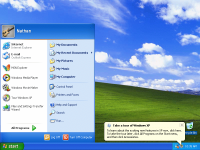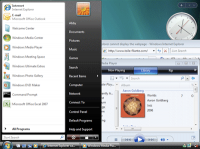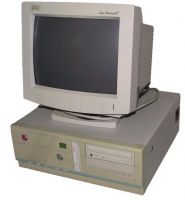The Interface Strikes Back
Recently I bought a new laptop. Since then, I have been in heavenly misery.
 Pre-new machine, my life was simple. My machine being about five years old, I lacked the basic technology for a survival in this hyper up-to-date current age. Although most up-to-date when I got it - I was one of the rare persons to use Windows XP back then -, the machine had by long become completely outdated. My machine's touch pad and CD reader had been dead for about three and a half years. The battery life was non-existent - about 10 minutes. Storage was minimal - 26 GB -, a tiny peanut in this age of Lacie disks of 300 GB. All my ports were USB 1, which put a halt to all my attempts at using external CD readers to compensate for the lack of embedded systems.
Pre-new machine, my life was simple. My machine being about five years old, I lacked the basic technology for a survival in this hyper up-to-date current age. Although most up-to-date when I got it - I was one of the rare persons to use Windows XP back then -, the machine had by long become completely outdated. My machine's touch pad and CD reader had been dead for about three and a half years. The battery life was non-existent - about 10 minutes. Storage was minimal - 26 GB -, a tiny peanut in this age of Lacie disks of 300 GB. All my ports were USB 1, which put a halt to all my attempts at using external CD readers to compensate for the lack of embedded systems.
That machine was thus - let's put it plain - outdated. Yet that machine had been with me for so long, alongside its Windows XP OS, that using it was like playing with an old friend. My fingers knew by heart all the shortcuts and wandered happily in programs and between windows and folders. Once I got external storage space to get all my infrequent working folders out, the machine was running back again like never before despite my frustrations at not being able to read 95% of my DVDs. On a more serious note, I might have been outdated, but as a user I was efficient for knowing the specs and capabilities and - more crucially - limitations of my equipment.
 Now, post-new machine, I have a fantastic piece of kit: 160GB memory, 3hrs battery life, CD reader and burner, touchpad, three USB 2 ports. It is light. And I no longer have to use my special - safer but bulky - England-continental Europe adapter for the supply. Hardware and software-wise, I am up-to-date. Electronic entertainment is at last possible again. I can read all my DVDs, listen to whichever CD I want and burn all the back-ups I wish. I can carry the machine wherever I want without being worried of undue screws or joints breaking up, etc. Alas, I also have Windows Vista, and a trial version of Office 2007. Apparently it is to become a standard very soon for everyone. Yet because of it, I cannot travel anymore happily in the virtual spaces of my machine.
Now, post-new machine, I have a fantastic piece of kit: 160GB memory, 3hrs battery life, CD reader and burner, touchpad, three USB 2 ports. It is light. And I no longer have to use my special - safer but bulky - England-continental Europe adapter for the supply. Hardware and software-wise, I am up-to-date. Electronic entertainment is at last possible again. I can read all my DVDs, listen to whichever CD I want and burn all the back-ups I wish. I can carry the machine wherever I want without being worried of undue screws or joints breaking up, etc. Alas, I also have Windows Vista, and a trial version of Office 2007. Apparently it is to become a standard very soon for everyone. Yet because of it, I cannot travel anymore happily in the virtual spaces of my machine.
As a working user, now, I am in trouble. The Home Windows Vista pre-installed was full of crap I had to kill out: Google Earth - fun but heavy -, Google desktop - useful but kills the machine speed as it indexes continously folders - , ... Sure the clock on the side is pretty enough. Yet there was nothing wrong with the digital thing down there on the right. There was even a pre-installed Yahoo toolbar, and even an automatic link to e-Bay and Amazon.com... As for browser, always the good Internet Explorer, isn't it? Yikes. More problematically, with Office 2007, all my skills with shortcuts and with the program interfaces are gone. 'alt-a' is no longer leading to a 'save as', etc., etc. Instead you need to put a long-lasting 'alt' to access the potential shortcuts, which are quite different than before. Yesterday it took me about 30 minutes to find out how to access my list of customised styles in a paper I am writing. Styles no longer come through shortcuts anymore, well except for pre-installed with the programme. It is only through a window hanging around your document, and that you can access only by use of the mouse. In brief I am in shortcut-less misery and cannot keep wondering about the stakes behind this transformation of my beloved interfaces. Why did Microsoft feel the urge to change access to shortcuts? Ergonomical considerations? Why this image of an analogue clock? Why all these craps around? Special contracts with Yahoo and Google? Or is there also a policy of looking at statistics on internet and programmes' usages?
 To top that up, I am told that if I want to put a legitimate copy of Office 2007, there is a hidden register somewhere in the systems file that I have to clean up first... Uninstalling is no longer enough I am told, like when I was using my old PC 486 - an oldie in which you would insert programs via floppy disks one after the other, all 35 or 50 of them - back in 2000ish while finishing an MSc dissertation.
To top that up, I am told that if I want to put a legitimate copy of Office 2007, there is a hidden register somewhere in the systems file that I have to clean up first... Uninstalling is no longer enough I am told, like when I was using my old PC 486 - an oldie in which you would insert programs via floppy disks one after the other, all 35 or 50 of them - back in 2000ish while finishing an MSc dissertation.
Enough with my moaning... What struck me throughout the whole process is how things have changed little since the 1950s when a new machine was presented to you as a fantastic modernity better than the previous ones. My moaning sounds strikingly like that I got from Durward Cruickshank while interviewing him about his rewriting of programs from Algol into Fortran ... The irony is that I will probably moan like that again in three years time when I come to encounter the surely forthcoming Windows 2010...

